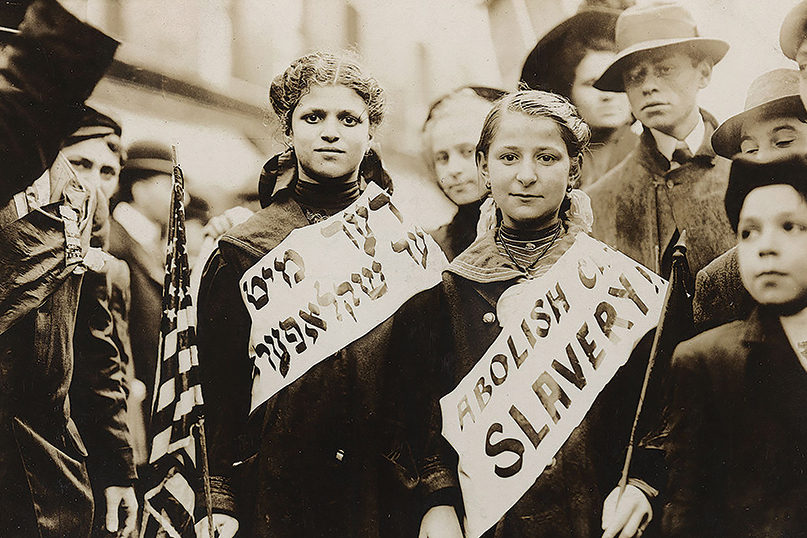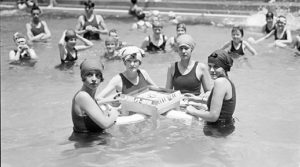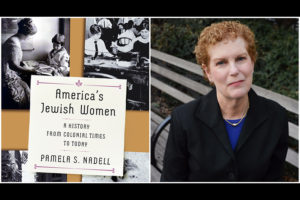

Jewish women play mahjong at Wordman Park Pool, 1924. (Library of Congress, Prints & Photographs Division, [LC-DIG-npcc-11609])
In 1987, the United States Congress passed legislation recognizing March as Women’s History Month. What better time to reflect on the achievements of ordinary and extraordinary American Jewish women throughout American Jewish history? A new book that highlights the accomplishments of strong and resourceful – but little-known – American Jewish women does just that.
A new book sheds light on little-known American Jewish women throughout history
By Josefin Dolsten
(JTA) – While looking at family photos, historian Pamela Nadell noticed how female relatives dressed differently with each generation. Her great-grandmother wore a high lace collar and covered her hair with a wig, like some Orthodox Jews. Her daughter’s go-to is a pair of skinny jeans.
Nadell, a professor of Jewish studies and women and gender studies at American University, saw an evolution in the images – not only in how her family members thought about being Jewish but of American Jewish women at large.
That inspired her latest book, in which she chronicles the history of American Jewish women. Nadell calls it “the culmination of a lifetime of scholarship.”

Pamella Nadell is the author of the forthcoming book America’s Jewish Women: A History From Colonial Times to Today. (Book photo: Courtesy of W. W. Norton & Company; Nadell photo: Sophia Myszkowski)
America’s Jewish Women: A History from Colonial Times to Today, which was released on March 5, combines the stories of prominent Jewish women – among them poet Emma Lazarus, labor organizer Bessie Hillman and Supreme Court Justice Ruth Bader Ginsburg – with those of women whose names are much lesser known.
Nadell, 67, doesn’t like to refer to the latter as “ordinary” but rather as “women whose lives were spread over smaller canvasses.”
“I don’t want to just talk about the famous,” she said in a phone interview. “That’s not really women’s history. Women’s history is understanding the breadth and trajectory of women’s lives writ large.”
In the book, readers learn about Rachel Lazarus, who moved to Wilmington, North Carolina, in 1821 after marrying a widower. Disappointed by the small Jewish community and in search of a congregation, she and her husband started praying in an Episcopal church. Lazarus ended up converting to Christianity on her deathbed, against her husband’s wishes. Her letters to the mostly forgotten British novelist Maria Edgeworth offer a valuable portrait of Southern domestic life in the early 19th century.
There is also Rose Hatkin, an immigrant to the United States in the early 1900s, who “could feel grateful for her three-room domain that held her two brass candlesticks carried all the way from Poland, an icebox, a cabinet for meat and dairy dishes, and an inkwell, a souvenir from her Niagara Falls honeymoon.”
Nadell sees many parallels between the history she covers and issues facing American Jewish women today. She documents instances of anti-Semitism in the 20th-century women’s movement, such as at a conference in Copenhagen in 1980, when the Israeli delegates “were shouted down and even physically menaced” and a non-Jewish author “heard people say that having Jews … in the women’s movement ‘gave it a bad name.’”
Speaking to JTA, Nadell drew a line between those experiences and current allegations plaguing the Women’s March, whose organizers have been criticized for not doing enough to call out anti-Semitism and some of whom have expressed support for the openly anti-Semitic Nation of Islam leader Louis Farrakhan.
“I think it’s important that readers know that there was anti-Semitism in the women’s movement in the 1970s and 1980s and 1990s,” she said. “This isn’t new. How can you effect change if you don’t know the past?”
The author also sees a parallel between Jewish women’s involvement in the labor movement in the early 1900s and Jewish women’s activism today.
“Jewish women’s involvement today in fighting for better conditions or protesting changes they don’t want to see happen, like restrictions on abortion rights, I see a direct line to the earlier women that I talk about in the book,” she said.
Some parallels concern internal community issues. Nadell shows that even in colonial times, Jewish families and congregations were worried about intermarriage.
A Jewish colonial-era woman named Abigail Franks wrote that she was “Soe Depresst that it was a pain … to Speak or See Any one” after her daughter Phila married a non-Jewish man.
Two centuries later, Nadell writes, another Jewish woman, Sarah Pene, secretly married a Catholic man after her mother refused to accept him despite his offer to convert. Around that time there was increased consternation about the phenomenon, though rates of intermarriage were far lower than today. In 1939, Nadell writes, “a Chicago rabbi denounced a recent spate of intermarriages.”
Nadell says there’s been talk about Jews and intermarriage, especially involving Jewish women, since colonial days.
“I write about Abigail Levy Franks’ reactions to her daughter Phila’s intermarriage,” she said, “and I don’t think anyone having the conversation about intermarriage today knows anything about that.”
While writing the book, Nadell found that certain women stood out. One of her “favorites” is Caroline Spiegel, a Quaker woman who converted to Judaism before marrying her husband Marcus. At the end of 1861, Marcus enlisted to fight for the Union Army in the Civil War and the two corresponded by letters.
His letters survived while Caroline’s did not, so historians have mainly focused on his experience.
“I was really drawn to her story,” Nadell said. “His letters are published and they are so well known, but nobody has ever really thought to read them to see what they told us about the life of a wife whose husband was away during the Civil War.”
Ultimately, she hopes the book will help increase awareness of the importance of studying Jewish women’s history.
“We talk about African-American women, we talk about Latinx women, we talk about Native American women,” she said. “We write about women of different social classes, we write about women from the South. I also think we need to recognize that America’s Jewish women have a distinctive history.”
Finding Aid and Advocacy for Jewish Women
The following American Jewish organizations advocate and educate on behalf of Jewish women. (Courtesy of MyJewishLearning.com)
Jewish Women’s Archive
The mission of JWA is to uncover, chronicle, and transmit to a broad public the rich history of American Jewish women.
Jewish Orthodox Feminist Alliance
JOFA works to expand the spiritual, ritual, intellectual, and political opportunities for women within the framework of halakhah – Jewish law.
National Council of Jewish Women
A volunteer organization at the forefront of social change for more than a century – championing the needs of women, children, and families – while taking a progressive stance on such issues as child welfare, women’s rights, and reproductive freedom.
Women’s League for Conservative Judaism
The largest synagogue-based women’s organization in the world. As an active arm of the Conservative/Masorti Movement, the organization provides services to 600 affiliated women’s groups in synagogues across North America.
Hadassah, The Women’s Zionist Organization of America
A volunteer women’s organization whose members are motivated and inspired to strengthen their partnership with Israel, ensure Jewish continuity, and realize their potential as a dynamic force in American society.
Women of Reform Judaism
The women’s affiliate of the Union for Reform Judaism, the central body of Reform Judaism in North America. WRJ represents more than 65,000 women in over 500 women’s groups in North America and around the world.
Bais Chana Women International
Provides Jewish educational programs for women.
Eyaht
A full-time college in Jerusalem for advanced Jewish learning designed to inspire Jewish women to maximize their potential.
Jewish Women’s Health
The Hilchot Niddah Guide for Medical Professionals.
Jewish Women International
Dedicated to ending violence against women.
Kolech
An apolitical, nationwide organization dedicated to the advancement of women within the framework of Jewish Law.
Kolot
Provides insights and practices from the study of gender and Judaism to the Jewish community.
Modern Jewish Mom
Helping Jewish moms make Jewish homes.
Nishmat
A Jerusalem-based learning community for women.
Rosh Hodesh: It’s a Girl Thing!
A values-based, experiential and transdenominational Jewish program that aims to strengthen the self-esteem and Jewish identity of girls in grades 6-12.








 Southern New England Jewish Ledger
Southern New England Jewish Ledger







